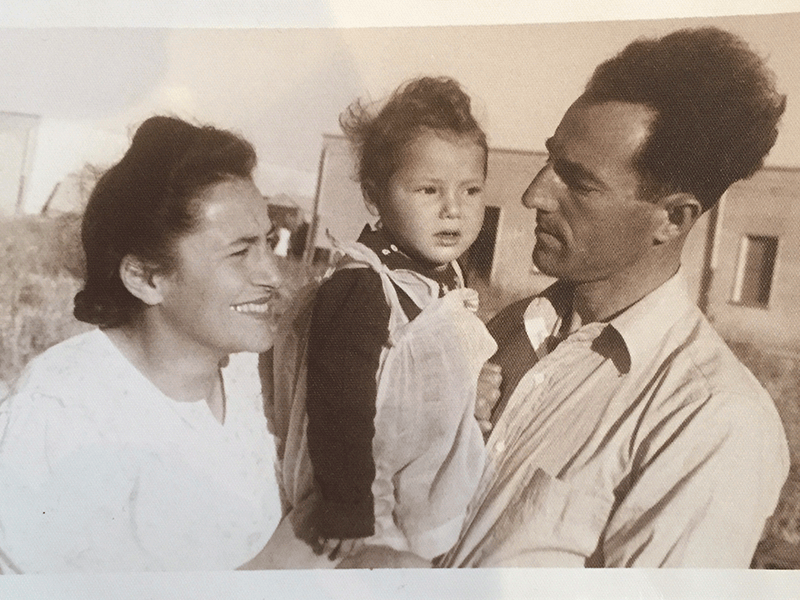Dora Ennis’ birthplace is still a warm, sunny idyll. Yet she visibly shivers as she recalls it fondly.
A Toronto interior design consultant who turned 70 last month, Ennis is among a small group of Jews who were born in Santa Maria di Leuca, a picturesque fishing village at the southernmost point of the Italian boot’s heel. It was in this unlikely place, in this little-known chapter of Holocaust history, that her parents and aunt found themselves after World War II, among hundreds of displaced Jewish survivors.
Between 1945 and 1948, some 200 babies were born in the village to Jewish refugees. About half the children were eventually taken Israel, with the rest scattered to the United States, Canada and elsewhere.
“I was the 107th baby born,” Ennis tells The CJN. It was amazing, she agrees, that these women were able to get pregnant, given the physical abuse they had suffered in concentration camps. “My mother told me years later that her biggest fear was not being able to have children.”
Ennis’ Polish-born mother, Toba Piekarczyk, had survived Auschwitz, while her father, Harry Fisch, was hidden after the liquidation of the Ostrowiec ghetto. After liberation, they, like the other refugees, were transported to various towns and villages in southern Italy to await transit to Palestine, a maritime migration the British famously blocked.
In their new home, once a vacation spot for the wealthy, the survivors were free for the first time in years. They were fed, housed and clothed, and regrouped psychologically. The locals, poor fisherfolk and Catholic clergy, welcomed them with hospitality and warmth.
“They had life when life was taken away from them,” Ennis says.
On Jan 24, Ennis and her aunt, Susan Moneta, now 92, will witness their largely untold story on the big screen. The film, Shores of Light, made in 2015, follows three Israeli women born in Santa Maria di Leuca who make a return pilgrimage to the region to trace their parents’ footsteps and speak to locals.
The screening at the Spadina Theatre, is a collaboration between the consulate general of Italy, several Italian cultural associations and the Toronto Jewish Film Festival. Written and directed by Yael Katzir, an Israeli documentary maker, it has been screened more than 150 times in Israel, 50 in Italy and about 25 in the United States.
Heartwarming and poignant, the film blends rare archival footage with current testimonies that capture “a ray of light after great darkness,” as one review put it.
As Katzir has said, “the sun, the sea, but mostly the Italian human warmth toward the survivors, captured my heart and imagination. It is an amazing story of rebirth.”
Ennis, her parents and aunt are not in the film, but it’s still “her” story, she says, though she has no memories of the village. She was still a baby when her parents arrived in Toronto in early 1948.

About 1,400 Jewish refugees and 400 non-Jewish ones arrived in Santa Maria Di Leuca in the postwar years. Housed in villas that were seized by the Allies, the survivors frolicked in the ocean, formed soccer teams and Zionist factions, even sang in church choirs.
Their care was overseen by the United Nations Relief and Rehabilitation Administration (UNRRA) and the American Jewish Joint Distribution Committee.
They even shared their provisions with local Italians, who were struggling with postwar ration coupons.
The film paints a glowing portrait of locals, who remember the Jews’ tattoos and yellow Stars of David. One even recalls, tearfully, how they sang Am Yisrael Chai.
The hospital where Ennis and others were born was run by nuns, “and they were wonderful,” she says.
The three Israeli women portrayed are still enchanted with the place and enamoured of the people. “It’s a miracle of revival,” one says, wiping away a tear.
When speaking of Santa Maria di Leuca – often just called Leuca – Ennis sometimes shudders.
She’s been to Italy a few times, and in 1999, she visited the village. “I’m not a spiritual person,” she says, “but when I land there, there’s an incredible calm that comes over me, and I feel like I’m home.”
Ennis says she plans to return to Santa Maria di Leuca this June.
